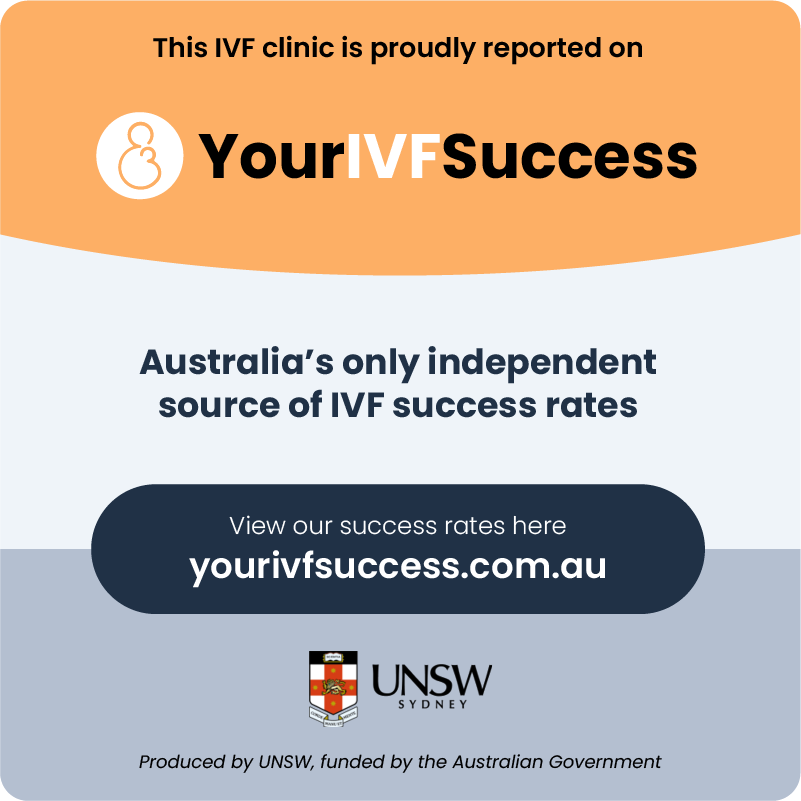Donor Program
Sperm Donation
Who needs it?
In situations where the man...
- has no sperm and there is no effective medical or surgical treatment possible to change this
- has a male related condition that has a high chance of being passed on to his children
- has severe impairment of sperm number, motility or quality
Single women and same sex couples who…
- who want to get pregnant
- who are unable to achieve a pregnancy without the use of donor sperm.
What is the success rate for conception?
18% following every cycle of Donor Insemination (DI)
DI may be the simplest and most successful ART option for many women.
We limit DI to 2 cycles because of limited availability of donor sperm. We then offer women or couples IVF treatment.
The woman is required to undergo a test to confirm that the fallopian tubes are open prior to having DI.
SELECTION REQUIREMENTS – SPERM DONORS
Sperm donors…
- 21 to 45 years
- in good health with no history of hereditary disease
- if married or in a de facto relationship, the donor’s partner must have counselling
SELECTION REQUIREMENTS – SPERM RECIPIENTS
Sperm recipients…
- 21 to 43 years
- must meet the requirements of the Assisted Reproductive Treatment Act (2008)
Egg Donation
- is unable to produce her own eggs due to premature menopause This affects 1 in 100 Australian women under 40 years, and 1 in 12 women who have had Chemotherapy
- has an hereditary condition that has a high chance of being passed on to her children
- has failed to conceive after repeated routine IVF treatment when an egg related problem has been identified
- 21 to 35 years (those older than 35 years will be assessed on a case-by-case basis)
- Excellent overall health
- No identified Genetic or hereditary conditions
- Non smoker
- Be in very good health
- Have no major health conditions that would make pregnancy dangerous to them
- Be a non smoker
- Her partner must be a non smoker
- To be on the Ballarat IVF waiting list , must be between 18 to 42 years.
- To be a recipient form a known donor, be 18 to 52 years
- issues associated with telling the child
- access to information
Embryo Donation
Embryos can be stored for 5 years under Victorian law. Patients who have completed their family must choose to use, discard or donate their embryos when the 5-year limit draws close. Some couples choose to donate their embryos rather than discard them.
Embryo donation is a very simple process. However, there are complex implications that must be explored by both potential donors and recipients.
Embryo donation is a commonly used fertility treatment option at Ballarat IVF.
Counselling prior to embryo donation is compulsory.
Donation of embryos for research is not offered at Ballarat IVF.
Who Needs It?
When a woman or couple have tried IVF, and are unable to get pregnant using their own eggs and sperm.
Things to consider - Potential Embryo Donors
If you have frozen embryos it can be difficult to decide whether to use them yourself , have them discarded, or donate them.
If you are considering becoming a donor you must consider the following issues carefully…
- you must be clear about why you are making this decision
- you may want to give a child a chance of life or a couple a chance of pregnancy
- you may want to give something back to the IVF program
- you may not want the embryos destroyed
- any children born from your donated embryos will be full siblings to your own children
- you also need to consider what you will tell your children
Things to consider - Potential Embryo Recipients
Embryo recipient patients need to be very comfortable with the fact that you will be the biological and legal parent, but not be the genetic parent. Many consider it to be like an adoption. You also need to consider what you will tell your children, and how you will feel if your children wish to make contact with the donors.


